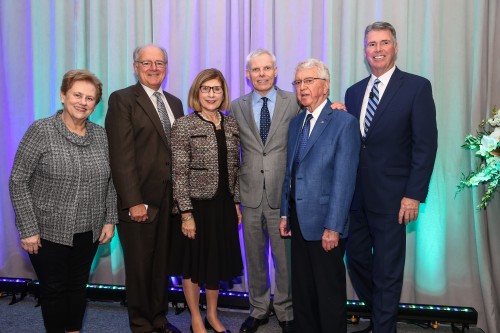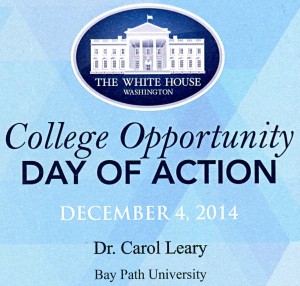
A Revolutionary Voice in Higher Education
In many ways, Bay Path University became the laboratory of thought for President Leary. The groundbreaking successes of the One-Day-A-Week Saturday program, the many niche graduate programs, The American Women’s College, and many more initiatives, solidified her belief that higher education needed to change if it were to fulfill its overall mission of providing access and of supporting students to the ultimate goal of graduation. Too often, higher education ignored adult women, underserved populations, and those who did not have the financial means to take the next step. There was an unshakable belief that the typical college student was an 18-year-old who, after four years of living on campus, would earn her or his degree. And learning, by and large, was a professor lecturing in front of a classroom.
The shifting demographics of America, combined with rapidly evolving technology and the constantly changing workplace, were the undercurrents that shaped President Leary’s philosophy on education. The One Day program also taught her a profound lesson: This new model of education demanded change in nearly every area of the institution. At Bay Path, areas such as student services, financial aid, registration, advising, and even parking were reengineered. Accelerated, flexible, supportive, and adaptive education were critical to adult students. Learning could just as easily take place all day on Saturdays, on a laptop in the kitchen, or on a Sunday night after dinner. In her mind, the old way of doing business needed to change, and Bay Path would be on the leading edge.

President Leary became one of a group of educators who were determined to reinvent a higher education system hampered by bureaucracy, tradition, and isolation. She advocated for institutions to have an entrepreneurial mindset that would push higher ed to rethink, or unbundle education, and be defined by student need, and not institutional priorities.

Key to this new way of thinking has been her commitment to online learning. As other institutions struggled with whether to put a course online, or whether a student could truly learn in such an environment, Bay Path was an early online adopter with our graduate programs. The great leap forward was the Social Online Universal Learning (SOUL) platform developed at The American Women’s College. SOUL’s data-driven technology is the engine for the online experience, and provides student centered adaptive learning and artificial intelligence to enhance the online classroom experience. The effectiveness of SOUL was amplified by a variety of elements inherent in the platform, including educator coaches, mentors, and online communities of support by peers.

Another hallmark of her legacy was her belief in collaborative higher ed ecosystems, capitalizing on the strengths of individual institutions that would result in lowering the cost of an education for students. Most recently, she has served on the executive committee of the Lower Cost Models for Independent Colleges Consortium (LCMC) and its off-shoot RIZE. She became the inspirational voice not just for Bay Path, but also for those higher education institutions looking for meaningful and impactful change. She was truly revolutionary.

As a result of Bay Path receiving a $3.5 million grant, President Leary, was a panelist at the U.S. Department of Education’s First in the World Project Director’s Meeting.
You can read more about President Carol Leary’s opinions on higher education in a recent article, “Leadership Lessons: Perspectives on a Twenty-Five-Year Presidency,” posted in Liberal Education, an online magazine of the Association of American Colleges & Universities. The link can be found at baypath.edu/presidentcarolleary

Photo Details
15th annual AICUM Awards. Pictured from left to right: Helen Drinan, President, Simmons University; Anthony Caprio, President, Western New England University; Carol Leary, President, Bay Path University; David Angel, President, Clark University; Charles Monahan, President, MCPHS University; and Richard Doherty, President, AICUM.
U.S. Department of Education’s First in the World Project Director’s Meeting. Pictured from left to right: President Leary; Amanda Gould, Vice President for Learning Innovation, Technology & Analytics, Bay Path University; and Heather Bushey, Associate Dean for Student Support Services, Bay Path University.
2019 Donna Shavlik Award. Pictured from left to right: Christina Cutlip, senior managing director and head of National Advocacy and Federal Relations Liaison, TIAA; Sherri Lind Hughes, associate vice president, ACE Leadership; ACE President Ted Mitchell; Carol Leary, president, Bay Path University; Gailda Pitre Davis, director, ACE Leadership; Christina Proscia, managing director, Institutional Client Services, TIAA.
